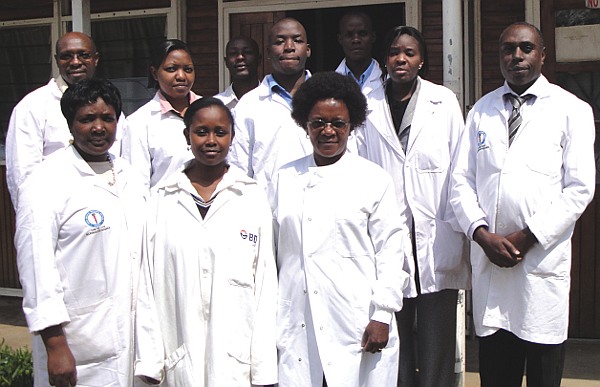Royal Society recognises Institute International Researcher

Dr. Sam Kariuki, a Wellcome Trust Sanger Institute International Fellow, has received the prestigious Royal Society Pfizer Award for his outstanding contribution to science.
The Royal Society Pfizer Award recognises a research scientist, at an early stage of their career, who is making an innovative contribution to biological and medical science and who has contributed significantly to capacity building in Africa by developing local research capabilities and promoting interactions between African and UK researchers. As well as the personal honour the award includes a grant of £60,000 to carry out a research project that is linked to an African centre of scientific excellence.
“I am delighted to have been awarded this fantastic prize and to receive this remarkable recognition by the Royal Society. This very generous grant will allow my team to continue our work on infectious diseases and to support further research on endemic enteric pathogens in my local region and also across Africa.”
Dr. Kariuki Chief Research Scientist at KEMRI Nairobi and International Fellow at the Wellcome Trust Sanger Institute
Sam graduated with a Bachelor of Veterinary Medicine from the University of Nairobi in 1989 and then obtained an MSc in Pharmacology and Toxicology at the University of Nairobi in 1991. He studied for his PhD in Tropical Medicine at the University of Liverpool in 1997.
Sam is an International Fellow at the Wellcome Trust Sanger Institute and is based at the Kenya Medical Research Institute (KEMRI) in Nairobi. He collaborates with the Institute’s Pathogen Team at the Sanger Institute Investigating invasive non-typhoidal salmonellosis (iNTS), which is endemic in sub-Saharan Africa. iNTS is a blood-borne infection that kills up to one in four of people in parts of sub-Saharan Africa who catch it. Sam identified a novel strain of Salmonella that was responsible for invasive disease, partially driven by the HIV epidemic.
Sam has made many outstanding contributions to the study of NTS over the years and is now an internationally recognised authority in his field, as well as a great mentor for local African scientists.
“This award given to Dr Kariuki is hugely merited and I am absolutely delighted he has received this honour. Throughout his career, Sam has been relentlessly committed to understanding and reducing the burden of some of the world’s most prevalent infectious diseases. He is an inspiration to all researchers.”
Professor Gordon Dougan, Head of Pathogens at the Wellcome Trust Sanger Institute
Sam’s in-depth understanding of the landscape of African science and the challenges associated with surviving as a scientist in these demanding conditions, allows him to study regional problems by integrating effectively with local communities and to work within the confines of the limited resources available.
“I am very pleased that the hard work of Sam and his team has been recognised by the Royal Society. Crucially this will strengthen his ability to make further valuable contributions to our understanding of infectious diseases and how they might be prevented and controlled through the development of new vaccines.”
Professor Mike Stratton Director of the Wellcome Trust Sanger Institute
More information
Wellcome Trust International Fellow – Dr Samuel Kariuki
Sam utilises molecular tools to investigate the field epidemiology of major enteric infections and antimicrobial resistance ecology and transmission in Kenya and the region. Infections of major public health importance here include invasive non-typhoidal salmonella disease, cholera, typhoid and dysentery.
Selected websites
The Royal Society
The Royal Society is a self-governing Fellowship of many of the world’s most distinguished scientists drawn from all areas of science, engineering, and medicine. The Society’s fundamental purpose, as it has been since its foundation in 1660, is to recognise, promote, and support excellence in science and to encourage the development and use of science for the benefit of humanity.
The Society’s strategic priorities emphasise its commitment to the highest quality science, to curiosity-driven research, and to the development and use of science for the benefit of society. These priorities are:
- Promoting science and its benefits
- Recognising excellence in science
- Supporting outstanding science
- Providing scientific advice for policy
- Fostering international and global cooperation
- Education and public engagement
KEMRI Wellcome Trust Research Programme
Conducting research to the highest international scientific and ethical standards to improve the health of the people of Kenya.
The Centre of Geographical Medicine Research Coast (CGMRC) is one of the ten centres of the Kenya Medical Research Institute (KEMRI). It is home to the KEMRI-Wellcome Trust Research Programme and is well known internationally for its work tackling malaria and other infectious diseases, particularly bacterial and viral childhood infections.
The Wellcome Trust Sanger Institute
The Wellcome Trust Sanger Institute is one of the world’s leading genome centres. Through its ability to conduct research at scale, it is able to engage in bold and long-term exploratory projects that are designed to influence and empower medical science globally. Institute research findings, generated through its own research programmes and through its leading role in international consortia, are being used to develop new diagnostics and treatments for human disease.
The Wellcome Trust
The Wellcome Trust is a global charitable foundation dedicated to achieving extraordinary improvements in human and animal health. We support the brightest minds in biomedical research and the medical humanities. Our breadth of support includes public engagement, education and the application of research to improve health. We are independent of both political and commercial interests.


